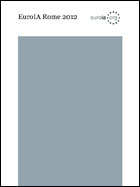“An agronomist’s unexpected path to UX Design” - Raffaella Roviglioni at EuroIA
I’ve live-blogging EuroIA in Rome. I’ve posted notes on talks by Gerry McGovern, Peter J. Bogaards and Birgit Geiberger & Peter Boersma.
I was really looking forward to Raffaella Roviglioni talking about her unique path into UX, and I wasn’t disappointed.

EuroIA Rome 2012
by Martin Belam
All of my notes from the 2012 EuroIA conference in one ebook, featuring coverage of talks by Gerry McGovern, Peter J. Bogaards, Andrea Resmini, Eric Reiss, Jim Kalbach, Carola Weller, Sara Wachter-Boettcher and Stephen P. Anderson
Available free for iBooks, for Kindle, and as a PDF
“An agronomist’s unexpected path to UX Design” - Raffaella Roviglioni
Raffaella talked about how some of the work she had done as an agronomist on projects in Senegal prepared her for life in the UX world. One of these key lessons was to be aware of cultural issues when carrying out research. In questions afterwards, Raffaella had suggested that training for an agriculture related role in Italy had made her one of the few women in a male-dominated conservative area of life, but in Senegal she was the only one who was able to interview women during field trips, because of their cultural conservatism about men and women interacting.
She said that in Senegal she had very much valued the services of someone who was so much more than a mere translator, but who helped her with context and history. This, she said, contrasts with UX projects, where often we work on having very short timescales to get to grips with a client’s problem before we need to start researching and proposing solutions. Look to find your cultural translator in any business you find yourself working in.
Over time she had learned about the difference between having “a script” and “a plan”. When she was first doing interviews in the field, she said she was “obsessed” with following the script, and got frustrated with people when they meandered off into their own unique story-telling path. Later she realised that this was how you got the best research - by letting people talk, and by knowing your research plan so well that you could adapt and follow the flow of information that they were giving you. Often, she said, people want to tell their stories but don’t know how - as a researcher you need to enable them to find their voice.
Raffaella also made the point that the “formal study” is not the whole thing. Sometimes the relief at ending an “interview” will be the trigger that causes someone to disclose something really interesting and vital.
And look for serendipity in research. It was Raffaella’s justified fear of poisonous snakes in Senegal that led her to seek refuge on a high platform. She ended up sharing it for several nights with the village elder which, she said, was “an incredible and inspiring exchange of ideas”.
She also had a great story about getting junk data. After weeks of carefully jotting down the measurements from an evaporation pan, she spotted one of the workers washing their shirt in it, invalidating all the data. Focus on your formal studies by all means, she said, but don’t be blind to everything else that happens around it.
She recommended Ken Robinson’s books. He talks about the magic moment when you discover the fusion of what it is you love and what it is you are good at, where our work becomes our play. Raffaella said she couldn’t imagine doing anything where she didn’t feel like she was having an impact on people’s lives, whether that was in the field in Senegal, or as a UX designer.
In questions afterwards Jan Jursa made the observation that when we are hiring UXers, often we ask for something ridiculous like ten years experience in responsive design, but we don’t pay much attention to what people did before. Gerry McGovern added an anecdote about seeing a Googler with a t-shirt saying “Get out of the building” - saying that one of the rarest and most valuable UX skills was that ability to get out of the organisational mindset, and to get into the thinking of real life users.
Next...
I actually managed to take notes from two simultaneous presentations. Next up is “Stupid bloody system!”...
This is one of a series of blog posts about the talks I saw at EuroIA 2012 in Rome. You can download the whole lot in an ebook for iBooks, for Kindle or as a PDF
“The dirty magnet” - Gerry McGovern
“Helping businesses to tackle a ‘wicked problem’” - Peter J. Bogaards
“Process & People” - Birgit Geiberger & Peter Boersma
“An agronomist’s unexpected path to UX Design” - Raffaella Roviglioni
“Responsive IA: IA in the touchscreen era” - Martin Belam
“‘Stupid bloody system!’: Bad IA in the workplace” - Jonas Söderström
“On beauty” - Andrea Resmini & Eric Reiss
“RITE: Testing and a business driver” - Jim Kalbach & Carola Weller
Building a coupon app for iPhone - Hermann Hofstetter & Gregor Urech
“Micro IA and content that travels” - Sara Wachter-Boettcher
“What am I curious about?” - Stephen P. Anderson
You can also download all my notes from the previous EuroIA in Prague as one PDF or as an ePub document.
